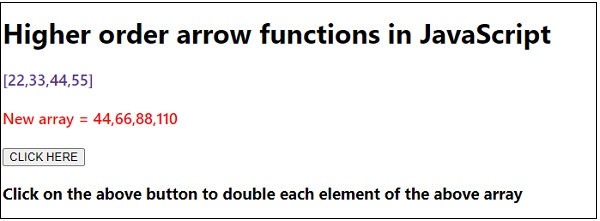
 Data Structure
Data Structure Networking
Networking RDBMS
RDBMS Operating System
Operating System Java
Java MS Excel
MS Excel iOS
iOS HTML
HTML CSS
CSS Android
Android Python
Python C Programming
C Programming C++
C++ C#
C# MongoDB
MongoDB MySQL
MySQL Javascript
Javascript PHP
PHP
- Selected Reading
- UPSC IAS Exams Notes
- Developer's Best Practices
- Questions and Answers
- Effective Resume Writing
- HR Interview Questions
- Computer Glossary
- Who is Who
Higher-Order Arrow Functions in JavaScript.
JavaScript treats functions as objects and allow us to pass functions as parameter to another function and even return functions from other functions. In JavaScript, the functions are first class functions i.e. we can store them in variable, objects and array. The higher order arrow functions can take function, return them or do both.
Following is the code for higher order arrow functions in JavaScript −
Example
<!DOCTYPE html>
<html lang="en">
<head>
<meta charset="UTF-8" />
<meta name="viewport" content="width=device-width, initial-scale=1.0" />
<title>Document</title>
<style>
body {
font-family: "Segoe UI", Tahoma, Geneva, Verdana, sans-serif;
}
.result,
.sample {
font-size: 18px;
font-weight: 500;
color: rebeccapurple;
}
.result {
color: red;
}
</style>
</head>
<body>
<h1>Higher order arrow functions in JavaScript</h1>
<div class="sample">[22,33,44,55]</div>
<br />
<div class="result"></div>
<br />
<button class="Btn">CLICK HERE</button>
<h3>Click on the above button to double each element of the above array</h3>
<script>
let resEle = document.querySelector(".result");
let BtnEle = document.querySelector(".Btn");
let doubleNum = (ele) => {
return ele * 2;
};
let arr = [22, 33, 44, 55];
function doubleArray(arr, fn) {
let doubleArr = [];
arr.forEach((element) => {
doubleArr.push(doubleNum(element));
});
return doubleArr;
}
BtnEle.addEventListener("click", () => {
resEle.innerHTML = "New array = " + doubleArray(arr, doubleNum);
});
</script>
</body>
</html>
Output

On clicking the ‘CLICK HERE’ button −


Advertisements
